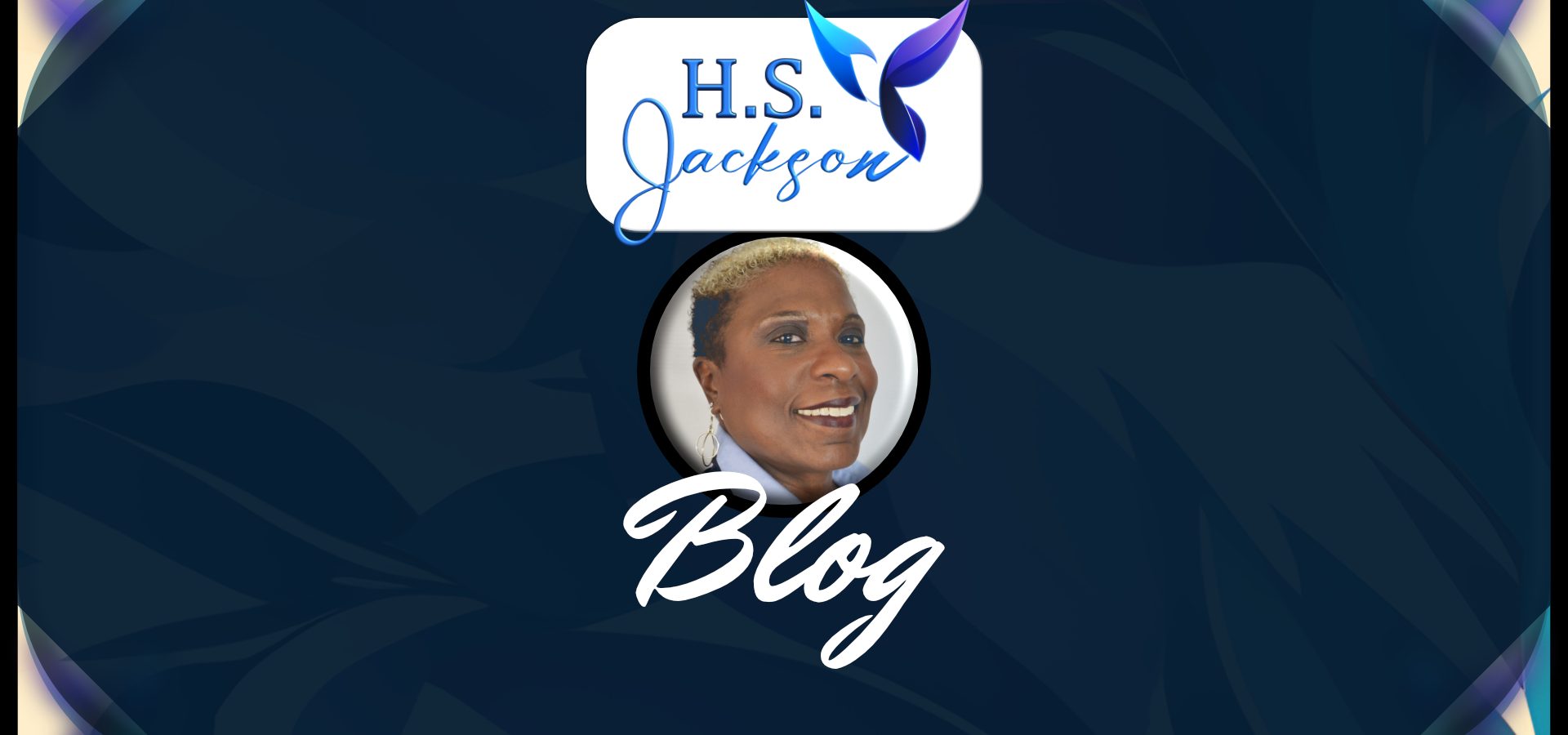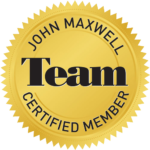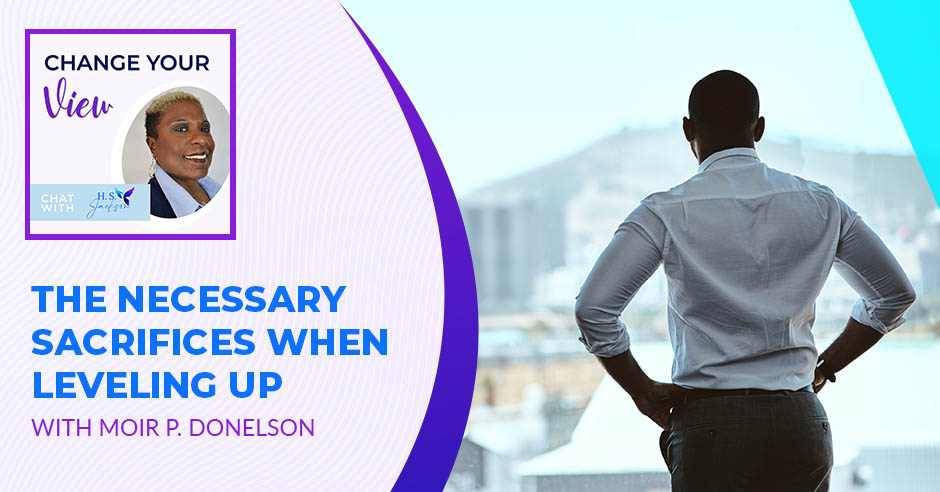
The road towards success is rocky, difficult, and unpredictable. But of course, leveling up cannot be accomplished without the necessary sacrifices. Haseena Shaheed-Jackson chats with Moir P. Donelson, CEO of Blue Chip Group and her grammar school classmate, to share how he put his entire life savings to invest in himself and chose to give up in order to get better. He explains the immense power of surrounding yourself with the right circles in realizing his visions and overcoming the fear to achieve his goals. Moir also talks about the pursuit of constant self-improvement, particularly how exploring beyond your usual circles can help you in that regard.
—
Listen to the podcast here
The Necessary Sacrifices When Leveling Up With Moir P. Donelson
In this episode, I have the opportunity to interview an old grammar school classmate whom I have not seen for many years. His name is Moir Donelson. He is a go-getter. He was the CEO of Teinnovations. He has been around working in many numerous leadership roles. He serves on the board of several organizations, including his three churches, United Way, Boys Hope Girls Hope, and American Red Cross Boys and Girls Club. He has been married to his wife for many years.
Prior to Moir even being the CEO, he worked with Kraft Foods, Olin Corporation, Alcoa, and Bain & Company. He has a Master’s degree from Harvard University. He is someone that I had the opportunity to reconnect with, that I felt he had a story that was so powerful that I felt that it needed to be shared. He showed me how he changed his view and how he took leaps and sacrifices in overcoming his fear to become the person that he is now. That takes tenacity, faith, and hope to not just lean into what you see with your eyes but seeing with your spirit.
I want you to join me in knowing his story and what he did to overcome the obstacles of his life to be the person that he is now. Let’s move over to the discussion that we had. I will see you back with a recap of our discussion and give you my views on what the show meant to me and what it said to me. See you back here soon.
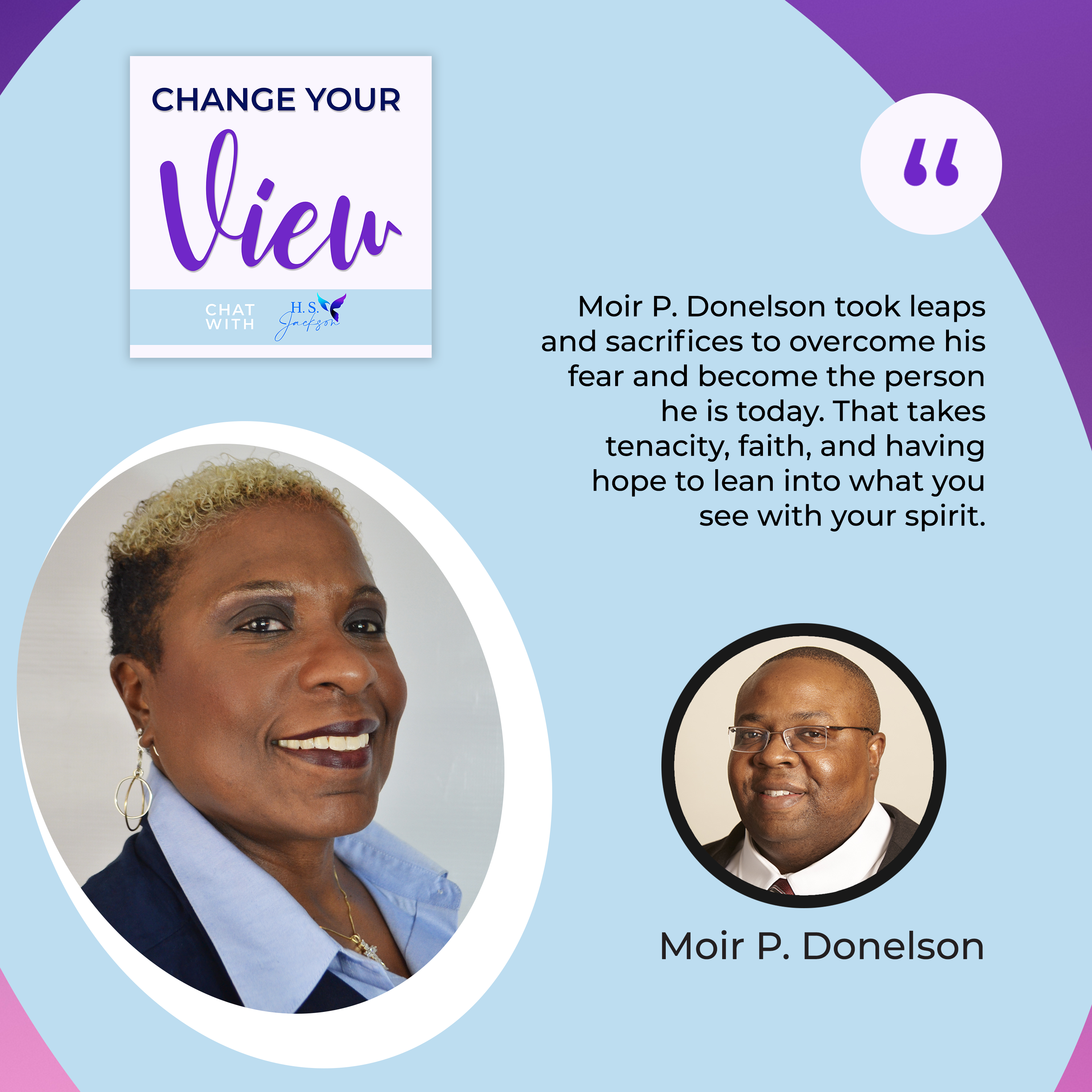
Moir, I’m so glad that you came on with me and that we were able to reconnect. For those who don’t know, this is Moir. He’s my grammar school classmate. We reconnected, and we had such an inspiring conversation that I thought it was good for us to share here. Just know that he has lived what I have been talking about for so long that I want to share and hope it helps others. Moir, tell us about what does it mean to give up in order to go up?
We are talking about giving up to go up. What comes to mind is the principle of delayed gratification. As my mother always told me, some of the worthwhile things in life, most people don’t achieve because they are not willing to sacrifice to achieve them. As you are thinking about your life goals, there is a context of, “What do I want, and what am I willing to give up to achieve it?” I will tell you about a couple of practical applications of that in my own life. When I was working as an engineer at Motorola, I wanted my wife to have the ability to stay home with our future children. To do that, I knew I’d have to maintain a lifestyle. I would have to increase my salary significantly.
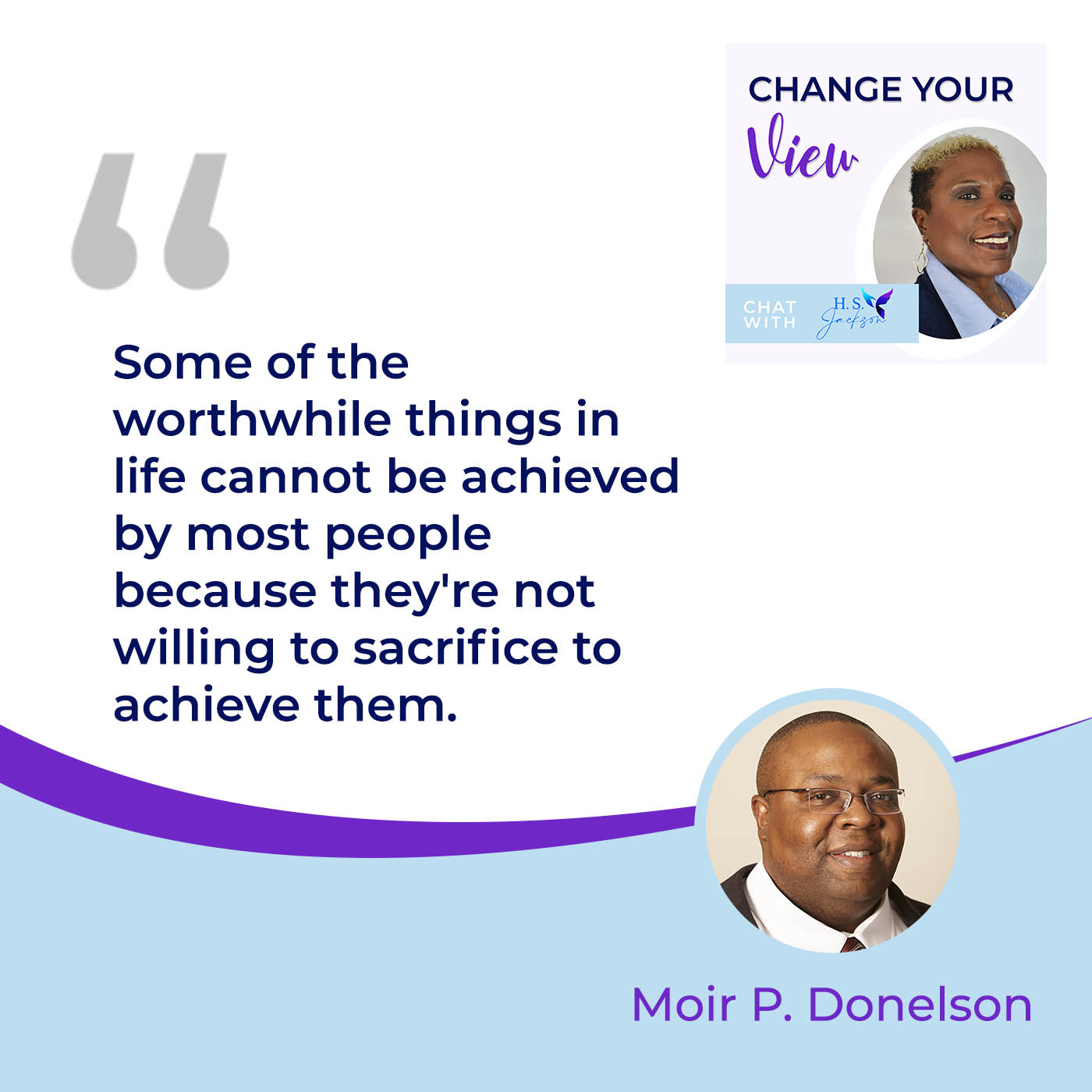
I researched top salaries and what it would take to get there. What I found is that coming out of the top business schools in this country: Harvard, Wharton, University of Chicago, and Northwestern, those had attractive salaries, and I felt that I could achieve both. What triggered me to do that is that my wife dropped off our first child at daycare. She cried in the most uncontrollable fashion that I’d ever seen. As a husband, watching your loved one go through that, if you have cared for your wife, moves you to action. I made a commitment to myself that while she has to maybe not be there for child number one, she will be there for any other future children. I will get her out of the workforce for child number one as soon as possible.
I read five books on how to get into the top business schools. I talked to everyone I knew that never went to any of those schools. I took copious notes. I spent my entire life savings educating myself on how to take the GMAT and score the highest on the GMAT, and educate myself. I’m making trips to Boston and Philadelphia to visit places like Harvard and Wharton. We had a few thousand dollars of savings and I spent every penny of it.
I told the wife, “I’ve got to go for this. It may not work out, but if I don’t give it my best, then I will regret it for the rest of my life.” As it turned out, all that work paid off. I got into Harvard Business School. Coming out of Harvard Business School, I quadrupled the salary that I was making before going in, and my wife was able to stay home, and she does not have to go back to work ever since. That’s one example.
The second example is what I’m doing now. I have been on a corporate journey for years and decided, with the help of a friend who knew me well, to become an entrepreneur. Corporate jobs are nice. A lot of times, they use the term ‘golden handcuffs’ because you got a nice comfortable salary and a nice comfortable bonus. A lot of things are predictable. The entrepreneurial world doesn’t work that way.
When you have a nice and comfortable salary, people tend to think you have a nice and comfortable bonus as well. However, the entrepreneurial world doesn’t work that way. Share on XWhen making the switch because a lot of times, if you go to private industry, they can’t afford your big salary. I took a 75% reduction in pay and moved to Chicago. My family was still in South Carolina. I had to add additional costs to get an apartment there. I’m not embarrassed to say this. There were times I had to drive Lyft. I am a CEO of a company driving Lyft to make sure the bills get paid. That’s what you had to do.
It took a while to build the business up to the point where I could raise my salary internally and have the board of directors raise my salary, but it paid off. Sometimes, and as you have seen when you go into entrepreneurial space, it may go in different directions. It’s a risk you are taking. Those are two examples that immediately come to mind on giving up to go up.
You raised a couple of different things that I want you to elaborate on because you didn’t talk about it, but 1) There was sacrifice. 2) There had to be fear. With all your life savings, you gave up on this dream. I love the fact that you said you read five books, so you invested in yourself. There are so many different things that you talk about here. Let’s talk about how did you get through that fear? There had to be fear when you said, “I gave all my life savings.” I’m sure your wife went, “Are you crazy?”
I think about George Jefferson back in the day when he would come home wheezy, we go, “Have you lost your mind?” How did you get past that? Many times, we are so focused on what we see with our eyes. That’s the whole thing that I think, which is why we are on here because I want people to see past their eyes that you saw with your spirit and soul what it is that you could achieve. Touch on those.
I’m a Christian. I’m a follower of Christ. I try to ensure that Christ is the Lord of my life. There is a spiritual dimension to this. I had a clear vision. In the first case, in terms of going to Harvard, it was two-fold. One is I wanted my wife to not have to work, and I wanted her to be home with the children, which was a clear desire.
The second one I didn’t talk about the first time we talked about, is I had come back to Chicago after being away in the military. I went to West Point Undergrad, which I didn’t talk about in my bio. Between West Point and Harvard, at about our ten-year reunion during high school, I came back. There was a tremendous amount of decline in just those ten years. I graduated from Julian, went to West Point, went into the Army, and started working at Motorola down in Texas.
I knew how hard it was for me to even go from Julian High School to West Point and to try to compete in the global economy at a higher level. The way it was declining, I thought it was going to be even more difficult for others. My desire to go to Harvard was to bring business opportunities and education back to inner-city Chicago. I’m still on a journey to get there. I have not gotten there. Part of these entrepreneurial ventures was to make sure I got seed capital and credibility to do that. It’s taking longer than I expected, but that is a second element of what I wanted to achieve.
Going back to the vision and the spirit of seeing past the fears that you brought up. I had a clear vision and a faith that I felt God was leading me to in both scenarios. The other thing with applying to Harvard, when I did the research reading these five books, one of the things I saw is that Harvard Business School put a stronger emphasis on essays than Stanford or Wharton did. Being an engineer, I wasn’t the best writer. I got on my knees, and I prayed often that God would send me someone to teach me how to write. I didn’t want anyone to write my essays. I don’t believe in cheating, but I wanted someone to teach me how to write.
Coincidentally, my wife was working with a woman, and my wife was telling the woman about me. The woman said, “Your husband sounds like a rocket scientist.” I was an electrical engineer working at Motorola at the time. She said, “I have a good friend named Bill Bergman who’s a rocket scientist, and I need to introduce you.” We met. Bill was a 6’7”, White German guy. You wouldn’t think he’s from rural Colorado. I’m from inner-city Chicago. You’d think we wouldn’t have a lot to connect on.
My wife and I were invited to a barbecue at their house. Bill and I sat and started talking, and we were eyeball to eyeball for four hours in conversation. During that conversation, I brought up to Bill that I wanted someone to teach me how to write in these top business schools. He said, “I was a Rhodes Scholar finalist from Centenary.” For those who know basketball, he played on the same team as Robert Parish, a Hall of Fame basketball player.
He was a 6’7” power forward. He was a jump shooter. I tease him about it. Although now that’s invoked in the NBA. Back then, I thought he should be going to the paint. Anyway, he was a Rhodes Scholar finalist. He’s still qualified to go to Oxford, and he studied English literature and English writing with English professors in England. He is one of the most phenomenal writers I have ever met. He said, “I would love to help you.”
During the process, prior to Harvard, I spent one and a half years writing nearly every day with him, probably 4 to 5 days a week, honing my writing skills just to get my essays ready. As you might imagine, the fact that God had sent someone to me that was an answer to prayer gave me confidence for the next steps. Taking a plane flight and spending money on prep courses for the GMAT because I knew what the vision was, and it was a noble vision. I felt that unless God was going to lead me in a different direction, I felt confident that if he had led me this way despite the challenges, he would see me through.
I also have been a bible teacher for three decades. One of my favorite stories in the Bible is where God had already given the children of Israel The Promised Land. All of the folks, the spies that Moses sent out to see The Promised Land, came back and said, “Moses, there are giants there.” Only two of them said, “We can take them.” That was Joshua and Caleb.
One thing about our life, and this is going back to your point about fear. There are always going to be giants in our life. The Promised Land was good. There were a lot of good things. There was a permanent settlement for the children of Israel. Even though God told them, he had given them the land, he still had giants in that land. Even though God has a vision for your life, it doesn’t mean that it’s going to be an easy walk into that vision. You still may have to take on giants. Just because you are facing giants doesn’t mean that the vision is not real.
If you know that you are getting this vision from God, I will speak in my case. I can’t speak for anyone else. Then when the giants come, God will get you through the giants. What ended up happening was the giants had already feared because they had heard stories about the fact that God had drowned the Egyptians, the most powerful nation in the world in the Red Sea, when he found out about the plagues. They were already scared of the Egyptians. We don’t know that.
We have to have the faith to walk into our destiny despite whatever giants we may see if we know now. If it’s just our feelings, you can’t be foolish. You have to know that you are being led because you could do something foolish. I’m about to become a rock singer or R&B singer and spend my life saving to do it. If God didn’t lead you to do that, and you tell your wife you are about to spend your life savings to be an R&B singer, that may not be the right thing. However, if you are clear that God has lined it up or if he has ordered it, he will pay the check is what I have learned in my life.
If you’re clear that God has lined up something for you, He will pay the check for it. Share on XYou raised an interesting concept with a couple of things you said there. One is about consistent steps. You kept taking those consistent steps which kept building upon your vision, and that’s what helped you get reinforced that you were going the right way. The other thing that comes to mind is a diamond. The cut is what makes it so valuable, so it has to continue to be refined. I go back to what you were saying is that you were going through these steps where you had to learn to write, and you needed to write better. You knew all these things that you had to go through this process of being refined to get where you are now.
That’s a lot of times that we have to understand. As you go down, it’s not going down because you are getting worse. You are going down because you need to be cut. You have to get those slashes in order to bring out that brilliance that sets you off in that greatness. That’s what I see what occurred with you. I love it. We have to not allow the giants because we allow people in our lives to be giants that they are just men and women like you and me. We have to overcome those obstacles so that we can go forward to where we need to be in life. You wouldn’t be where you are now if you had allowed the giants in your life to take hold.
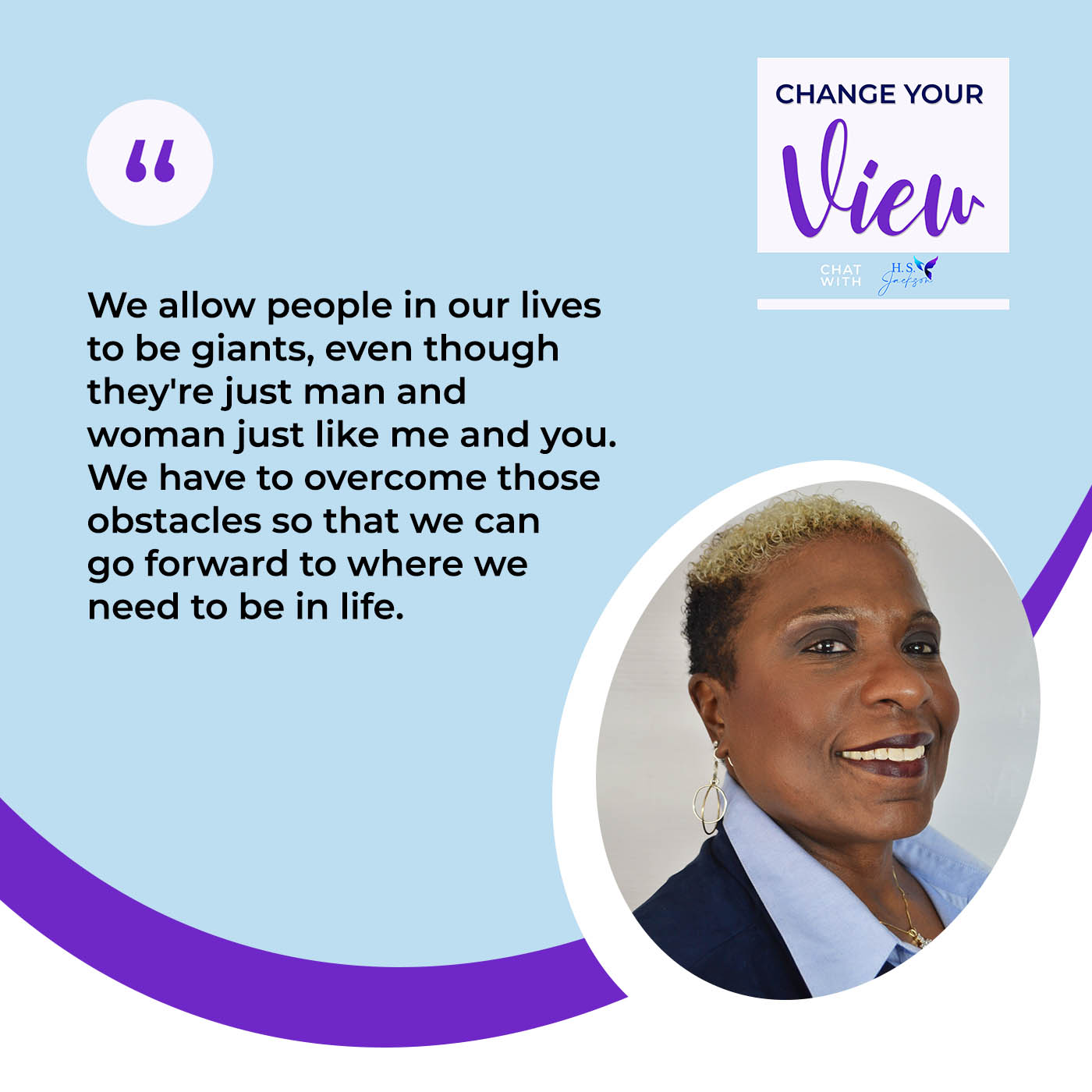
You touched upon what I would like to segue into, which is your circle. You met a man who took you underneath his wings, and you had never met him before. The whole thing is that you met him because you were willing to have that conversation to be authentic, be honest, and show him what you needed. In turn, he wanted to help you. I want to talk about the circle. The circle is the people that we have in our lives. They help sharpen us and help us to become better. That seems that was a big instrument and a big component that helped you along your journey. How important is a circle to you?
I think a circle is critical. When I have mentored people, what I have told them is that there are two critical components to success in addition to the vision and goal, and that is who you are associating with and what you are doing in your free time. A lot of times, if you have a clear vision for your life and goals, there are folks that are not aligned with those long-term goals. While you can be friends with them, you have to limit exposure to people that are not aligned with your long-term goals.
For instance, you and I both grew up on the south side of Chicago, blocks away from each other. There are a lot of influences in our lives that were not positive to our long-term desires and goals. For instance, a lot of my friends had gotten involved in street gangs and drug dealing. When I came back from college, they were deeply involved and making more money than I could ever dream of, but I knew that wasn’t part of my long-term vision, so I’d limit my exposure to them. I still love them and I am still friends with them, but I’d limit my exposure.
I think what you are talking about is a circle of people that can help you, but you also have to eliminate the circle of people that can be a distraction to you. In terms of the people that can help you, once you get clarity on your goals, I will just speak from a personal faith, and then there are probably other pragmatic approaches to it as well. You pray for the right people that can align with your interests. Sometimes that circle can be people living and sometimes it can be people that are dead.
Get in touch with different circles of people to help you with your journey. However, you also have to limit these circles which can be a distraction to you. Share on XWhat do I mean by that? W. Edwards Deming, when I was trying to learn about manufacturing, had been dead for decades, but I read nearly every book I can get on hand that talked about private equity. When I was trying to understand investing, I read that Warren Buffett’s teacher was a guy by the name of Benjamin Graham. I would get Benjamin Graham’s book, and I would read it. These people became part of my circle of influence.
When I learned to buy companies, I talked to a lot of my classmates from college that were experienced in private equity and buying companies. I said, “What do you all look for in operators that you want to help buy companies with? What education do they need? What skillset do they need to have?” I tried to align myself with those types of people and have them as advisors for me. I would ask them to make introductions for people that could help.
I paid for seminars with private equity companies. I have now bought four different companies. These private equity companies that I have interacted with, folks that they have introduced me to, and books that I read about private equity have all been instrumental in teaching me the process of buying a company. Another one who also had passed away was an African-American gentleman by the name of Reginald Lewis. Reginald Lewis, my fraternity brother, Kappa Alpha Psi had bought Beatrice Foods. He wrote a book called Why Should White Guys Have All the Fun? He talked about how he went through the process of buying McCall communication settlement for a tremendous gain in return on investment and then turn around and buy Beatrice Foods.
That’s what you choose for your circle. Once you get clarity of where you are trying to go, give a lot of thought to what groups of people, dead or alive, can help you get there. You negotiate network, ask, research, find the folks alive that can get there, and then there may be a tremendous amount of books that are written along your path that you can learn about people that have already given a lot of wisdom on this. The books can even help inform you, so you can talk to the folks that are alive. By you being already informed, these people will say, “This person knows their stuff. They are not going to be a waste of my time.” It may allow you to have a more leveraged conversation with those people later.
A lot of times, we are fearful of reaching outside of our immediate circle of friends and people that make us feel comfortable to stretch and to read people that we have never met before. You have to be willing to pick up that phone or send that email and say, “You don’t know me, but I would like to have a 5 to 10-minute conversation with you. You have to make sure that you do your research to make it worth their while to even want to have a conversation with you.”
You can’t send an email to Moir and say, “I want to have a conversation with Moir,” and you don’t know anything about Moir. Spend some time in those 2 to 3 sentences that you sent them and you can say, “I read your book. This concept hit me and I would like to spend 5 or 10 minutes talking about that with you.”
That opens the door to being able to have more conversations with you because they let you know that at least they took the time to invest in themselves and know that they wanted to bridge this gap. That’s the way I see that. You have to put your time in, too. Just don’t call someone up. Put in your time to show that this is something that you are dedicated to and going to be collaborative and participating in.
No question because successful people tend to be busy. The thing that you mentioned that’s important is reaching out. There are going to be some people that are not going to spend any time with you. You will be surprised at the amount of people that will versus the amount of people that won’t. A lot of times, people are quite frankly flattered by the fact that you are reaching out to them.
I can remember my journey up. I was living in Austin, Texas. I saw these people living in these big houses, and sometimes they’d be out cutting their grass, and I just stop over. I know this is going to sound crazy because people may think you are a stalker, but I will stop and talk to them. I will say, “If you don’t mind me asking, what do you do for a living?” A lot of them are business owners. A lot of them that I talked to, the ones that were home cutting their grass in big houses, a lot of them were business owners.
A group of them, I said, “Would you mind if I bought you lunch and pick your brain?” Not all did, but a few took me up on it, and I learned. I would have a series of questions to ask them, “How did you get into business? What was your thinking? How did you manage risk?” That also helped inform me about another benefit of me getting an MBA because a lot of the risks that they talked about, I felt that MBA would help mitigate a lot of that risk. I would get a master-level education in business.
You are right. Overcoming that fear. People are people. As they have been successful, it doesn’t mean that they are not people. I had friends that were supermodels. This is a similar concept, different but a related concept. I said, “You must get a ton of dates.” My friend was a model. Maybe not a supermodel, but a model. She said, “You will be surprised. A lot of guys don’t ask me out.” I said, “Interesting.” Being a guy, what I recognize is that she’s so beautiful. The guy is probably intimidated and said, “She probably has someone. She wouldn’t pick me.” Probably some people that read this show will say, “I’m going to shoot my shot.”
People are always people. Just because they have been successful doesn’t mean they are not people anymore. Share on XThat’s right. Shoot your shot. What is a parting thought you’d like to leave with readers? Someone that’s sitting there on the fence and has that vision, but they just don’t know how to get started or what is it that they need to do. What is one nugget that you want to leave them with that will move them to take that action?
I read a lot of books by entrepreneurs. I read The Founder’s Touch by the founder of Motorola. The founder of Home Depot, I forgot the name of his book. I read his book. The McDonald’s Founder, Ray Kroc, I read his entrepreneurial book. I read How to Be Rich by J. Paul Getty, who made his money in the oil industry. The theme I saw with all of them is why I tell people, “Just go start doing it.” Formulate your plan, try to have it refined, and go.
You may learn. Don’t do anything stupid. I’m not saying throw away your life savings. Be thoughtful about what you are doing. Try to get your plan refined by as many educated people that know what you are trying to do as possible. Go do it. You are going to make mistakes, you are going to learn, you are going to improve, but just go do it and get started in whatever you are trying to do. That’s what I would tell you. If you are a Christian, pray like it’s up to God and work like it’s up to you.
I love that because I believe and see more. There’s a quote that I live by that says, “Don’t let anyone or anything quite that small voice that says that you were made for more.” You have to believe in that. Thank you for your time, Moir. I appreciate you being on the show and sharing some of your story because your story is powerful, and I know there’s a lot more to it, but I just wanted to touch upon the highlights. I look forward to having you on again at a future time and hope that this won’t be the last time.
I will be happy to do it.
—
That was an amazing discussion with Moir. He discussed how he put all his life savings and took the risk gambling on himself and his vision to press forward, to pursue that dream that he had, attending Harvard University and becoming the CEO of his company. How amazing it is that we have to let go of what we know in order to realize what it is that we believe in that we can become. That’s what it’s all about. We can’t hold on to what we have because if we hold on to what we have, we will never receive what it is that you can achieve.
You have to keep your mind focused on becoming better. He gave up in order to go up. You have to believe that you can continue to ascend even when you DC. That’s what Moir did. He descended to ascend. It’s a continual process. You have to give up in order to go up because what you have now can be replaced. Nothing that you have, you should hold on to thinking that, “This is the best I’m going to get,” because better and greater is achievable.
We have to change that view that we have of what we have in our hands and our physical sight. Instead, focus on the view that’s out there that we can’t see tangibly, but we have the feeling of the intangibles that can be realized. That’s what I want you to focus on. What are the actions and steps that you need to take to go up, ascend to a higher level, soar to a new height, go past where you are now, and raise the ceiling on where you are? I want you to raise that ceiling.
Use the nuggets and tidbits dropped in this episode. I want you to develop a plan of action for what are the steps that you need to take, consistent steps because, as Moir said, he would get through a step, then he would take another step. That’s what you have to do. Keep taking those consistent steps to keep building those staircases because, like Martin Luther King says, “You don’t have to see the entire staircase. Just keep building those steps as you go.” That’s what I want you to focus on. Going up, but giving up so that you can become greater because there is more in you. Believe that. Be more, see more, and live more. Don’t let anyone or anything stop you from going and achieving more.
Important Links
- Teinnovations
- Moir Donelson
- Why Should White Guys Have All the Fun?
- The Founder’s Touch
- How to Be Rich
About Moir P. Donelson
 Moir P. Donelson is a results-oriented, global executive with over 20 years of experience in leadership, operations, marketing, strategy, acquisition analysis and integration, and planning. Currently, Mr. Donelson serves as CEO of Blue Chip Group, LLC. He graduated from West Point with a Bachelor of Science in Electrical Engineering and received his MBA from Harvard Business School.
Moir P. Donelson is a results-oriented, global executive with over 20 years of experience in leadership, operations, marketing, strategy, acquisition analysis and integration, and planning. Currently, Mr. Donelson serves as CEO of Blue Chip Group, LLC. He graduated from West Point with a Bachelor of Science in Electrical Engineering and received his MBA from Harvard Business School.
